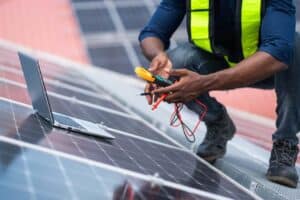As electricity costs are heading for R4/kWh, solar might be another way to save costs as it comes in at under R1/kWh fixed for the next decade.
South Africans are looking to cut costs as they battle with the high cost of living due to increasing electricity tariffs, amongst other factors.
Businesses have increasingly turned to solar power for electricity since the beginning of load shedding in South Africa. For some, the use of solar was also a cost-saving method.
Teresa Kok, director of One Energy says residential areas can also enjoy the same perks, as solar is cheaper than grid electricity.
ALSO READ: Trade watchdog imposes 10% duty on solar panel imports to ‘protect local industry’
Differences in cost between grid electricity and solar
She says the cost of the electricity grid is now increasing to R4/kWh, and it could still go higher. While solar comes in under R1/kWh, which will stay at this price for the next 15 to 20 years.
“Taking a viewpoint that Eskom will continue to increase prices by at least 12% and that municipalities are likely to add a further 2 to 3%, making it a 15% annum increase. This can simply mean your monthly electricity bill will double in less than four years.”
She says that the key benefit in both commercial and residential properties is solar will continue to generate savings and energy at a lower cost than grid electricity. Using solar also makes a significant contribution to reducing one’s carbon footprint and environmental impact.
Some cost savings measures can include rooftop solar PV, battery energy storage, gas for cooking and solar geysers. “The cost of Eskom’s electricity supply will continue to escalate as Eskom and municipalities scramble to make up for the declining sales volumes to cover their fixed costs and debt burden.”
ALSO READ: Saving money: Why households need to tackle their geyser heating costs
Benefits of Section 12B of the Income Tax Act
She says businesses can take advantage of the Section 12B tax incentive. “Section 12B of the Income Tax Act No. 58 of 1962 allows for a tax deduction in respect of certain qualifying assets (owned and brought into use after 1 January 2016) to reduce the taxable income of the taxpayer.”
The qualifying assets must be used for purposes of trade in the generation of electricity from renewable sources. For the period 1 March 2023 to 28 February 2025, the Section 12B allowance has been increased from 100% to 125% and no maximum cap on the output of the solar installation.
ALSO READ: Debunking renewable energy myths for SMEs
Operational costs and dependence on the grid
Kyle Durham, head of sustainability for FNB Business says solar power is the way to go as the long-term savings on operational costs and the lower dependence on grid electricity, which is set to continue rapidly rising in price in the coming years, make renewable energy the financially wise choice for any business. “solar energy is not too expensive, nor complicated to install.”
He says partial renewable energy use, in combination with grid-based power, can still lead to significant savings and enhance energy independence for any business. Having renewable energy systems means one will depend less on municipalities and Eskom electricity.
Support Local Journalism
Add The Citizen as a Preferred Source on Google and follow us on Google News to see more of our trusted reporting in Google News and Top Stories.







